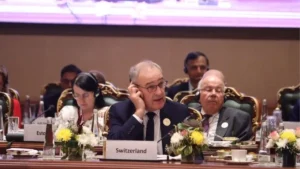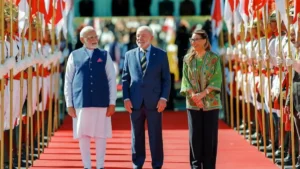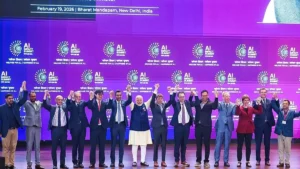According to the Global Energy Transition Index released by the World Economic Forum (WEF) on 19 June 2024, India has been ranked 63rd out of 120 countries, improving three ranks from last year’s 67th position. Sweden has again topped the Index, reflecting its continued leadership in energy transition. The WEF highlighted India’s significant advancements in energy equity, security, and sustainability.
Global Energy Transition Index Overview
The Global Energy Transition Index, published annually by the WEF in association with Accenture, evaluates nations’ progress and preparedness in building an equitable, secure, and sustainable energy future. It tracks government policies and their effectiveness in reducing carbon dioxide emissions, promoting non-fossil-based power sources, and enhancing energy efficiency.
2024 Rankings
European nations dominate the 2024 Index’s top ranks:
- Sweden
- Denmark
- Finland
- Switzerland
- France
China is ranked 20th, while India stands at 63rd. The report indicates that 107 out of 120 countries have shown progress in their energy transition over the past decade, despite challenges such as economic volatility and geopolitical tensions.
India’s Progress and Global Role
The WEF commended India’s initiatives in encouraging non-fossil-based energy sources, particularly solar energy. India’s improvements in energy security, equity, and sustainability are noteworthy, positioning the country as a critical player in the global energy transition alongside China. India is now the fourth largest in the renewable energy market globally, with renewable energy and biomass comprising 42% of its power generation capacity. Significant investments are also being made in electric vehicles and green hydrogen.
World Economic Forum
Founded in 1971 by German economist Klaus Schwab, the WEF is a non-profit international organization headquartered in Cologny, Switzerland. It aims to foster collaboration between global stakeholders to address common challenges. The WEF publishes several influential reports, including the Global Gender Gap Report, Global Competitiveness Report, Global Travel and Tourism Report, and Global IT Report.
Implications and Recommendations
The WEF suggests that other nations can replicate India’s policies and innovative initiatives for a green energy transition. Despite progress, the report urges further efforts to reduce coal usage and emissions, emphasizing the potential of green technology in shaping the future of energy systems globally.
World Economic Forum: Key Points
Purpose
- Collaboration Platform: Facilitates cooperation among business, political, academic, and other leaders to address global challenges.
- Global Issues: Focuses on shaping global, regional, and industry agendas to improve the state of the world.
Foundation
- Founded: 1971
- Founder: Klaus Schwab, a German economist
Headquarters
- Location: Cologny, Switzerland
Key Activities
- Annual Meetings: Hosts annual meetings in Davos, Switzerland, bringing together global leaders from various sectors.
- Reports and Research: Publishes influential reports like the Global Gender Gap Report, Global Competitiveness Report, Energy Transition Index, and Global IT Report.
- Initiatives: Launches initiatives and partnerships to address issues such as climate change, economic development, and social inclusion.
Notable Reports
- Global Gender Gap Report
- Global Competitiveness Report
- Energy Transition Index
- Global Travel and Tourism Report
- Global IT Report (in collaboration with INSEAD and Cornell University)
Overall Mission
- Improving the State of the World: Aims to drive impactful actions through public-private cooperation and innovative solutions for global progress.




 Geneva to Host AI Summit 2027 & UAE ...
Geneva to Host AI Summit 2027 & UAE ...
 India-Brazil Seal 10 Big Deals: A New Po...
India-Brazil Seal 10 Big Deals: A New Po...
 AI Impact Summit 2026 Concluded As 89 Na...
AI Impact Summit 2026 Concluded As 89 Na...








